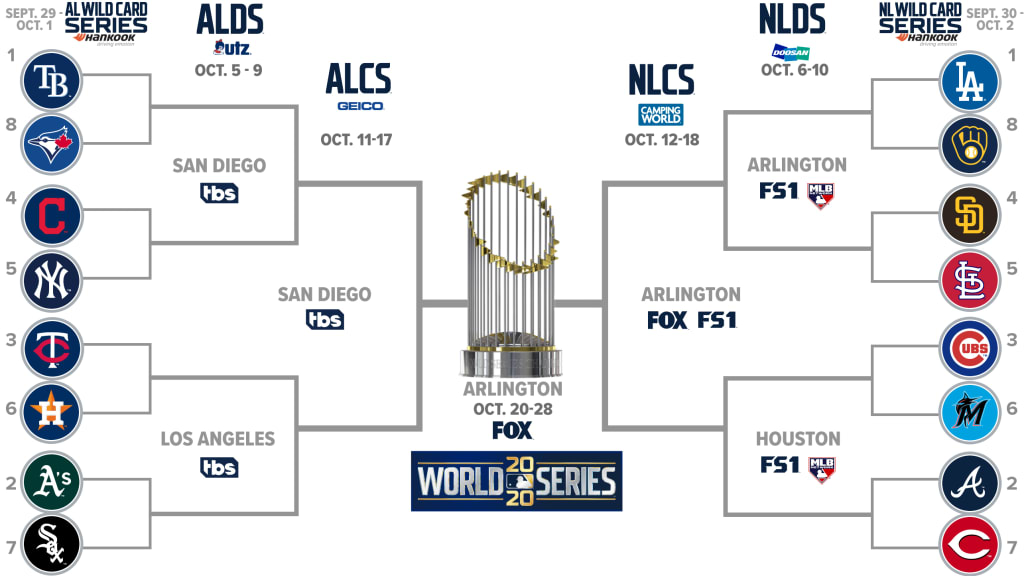
With the regular season of baseball under wrapped after a 60-game long (or in the Cardinals and Tigers case, a 58-game long) season, the Major League Baseball postseason is now underway. And for the very first time in baseball history, there will be an expanding number of qualified playoff contestants with 16 teams eligible for a chance at a World Series in 2020. This is largely in due to the season having been delayed back in late March, around the time that the Covid-19 pandemic started to come into play. And if recent reports by MLB commissioner Rob Manfred is any indication, this expanded playoff roster might be a new yearly thing from here on out. It will now look as though you don’t even need to have a winning record to get in the playoffs, let alone win a World Series. Just ask the Astros and Brewers!
The way this format works is how each team ranked themselves in the postseason standings. Not necessarily ranked by the best winning record overall in the entire league but how they fared in their own division compare to the other teams. How it works is that both leagues have a total of eight teams eligible for the playoffs. The first three teams are the ones who clinched 1st place in their own division, the next three teams are the ones that finished 2nd place in their division, and the last two teams are the ones who form the Wild Card. The teams in each separate category are ranked from the highest winning record out of their bunch to the lowest. Hence is why the NL Central champion Cubs are ranked higher than the 2nd place NL West Padres despite the Padres having a better 37-23 record than the Cubs’s 34-26 record. Or how even the 2nd place AL West 29-31 Astros is ranked higher than the Wild Cards of the 35-25 White Sox and 32-28 Blue Jays. Baseball just makes no sense!
Also, for the first time ever in baseball, there will be the Wild Card series which will decide the teams advancing in the first round of the playoffs. This will be a best-of-3 series where the team that is able to win just two games will be able to move on. This will undoubtedly create more tension for these teams, even more so than the simple Wild Card game that had become a staple since 2012. Unlike, the Stanley Cup Playoffs in hockey this year (that had a similar extra playoff round with the round-robin tournament), the top teams in both leagues WILL have to play these games AND win them if they are to advance.
The playoff brackets are categorized into eight seeds for each league. The No. 1 seed will face the No. 8 seed, No. 4 will face No. 5, No. 3 will face No 6., and the No. 2 will face No. 7. The winners of the No.1/8 series and the No.4/5 series will face each other in the division series along with the winners of the No.3/6 series and the No.2/7 series. Also, just like with the Stanley Cup, it will all be played in a bubble. The Wild Card Series will be played at the ballpark of the teams with the better winning records than their opponent. For the American League, the division series will be played in San Diego (winners of the No.1/8 and 4/5 series) and Los Angeles (winners of the No. 3/6 and 2/7 series). For the National League, their division series will be played in Arlington (winners of the No.1/8 and 4/5 series) and Houston (winners of the No. 1/8 and 4/5 series). The American League Championship series will be played in San Diego. The National League Championship series will be played in Arlington. Finally, the 2020 World Series will be played strictly in Arlington.
For the American League, the eight teams (in postseason standings order) include the division winners of the Tampa Bay Rays (40-20), Oakland Athletics (36-24) and Minnesota Twins (36-24), the 2nd place teams of the Cleveland Indians (35-25), New York Yankees (33-27), and Houston Astros (29-31) and the wild card spots of Chicago White Sox (35-25), and Toronto Blue Jays (32-28).
No. 8 Blue Jays vs No. 1 Rays
No. 5 Yankees vs No. 4 Indians
No. 6 Astros vs No. 3 Twins
No. 7 White Sox vs No. 2 Athletics
For the National League, the eight teams (in postseason standings order) include the division winners of the Los Angeles Dodgers (43-17), Atlanta Braves (35-25), and the Chicago Cubs (34-26), the 2nd place teams of the San Diego Padres (37-23), St. Louis Cardinals (30-28), and the Miami Marlins (31-29), and the wild card spots of the Cincinnati Reds (31-29) and Milwaukee Brewers (29-31).
No. 8 Brewers vs No. 1 Dodgers
No. 5 Cardinals vs No. 4 Padres
No. 6 Marlins vs No. 3 Cubs
No. 7 Reds vs No. 2 Braves
The Wild Card Series will start from September 29th to October 1st for the American League and September 30th to October 2nd for the National League. Television coverage of these games will be exclusively ABC, ESPN and TBS.
